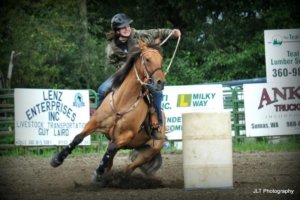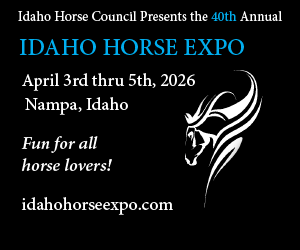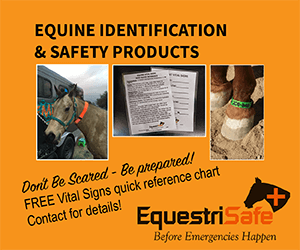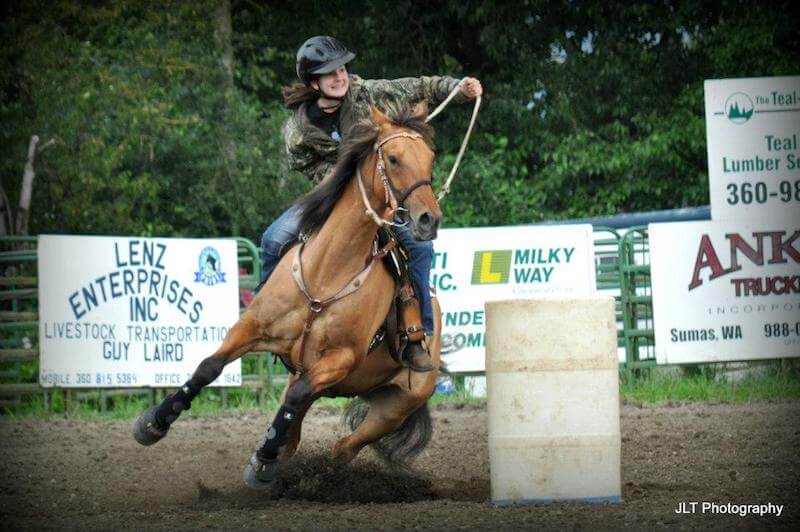How to Find the Best One for You and Your Budget
by Brigitte MacKenzie
Over the years, I’ve observed that the sport of barrel racing is one of the least formally coached equestrian disciplines. However, because of my background riding English, I have always advocated clinics and coaching. Recently I attended a lecture at the Horse Council of British Columbia in Langley where Dr. Andrew McLean shared the alarming statistics about horse/rider injuries. This indicates the real need for foundational coaching in any equestrian discipline.
Barrel racing is most often coached by inexperienced or unqualified instructors. With that in mind, I’ve used the following questions when looking for a coach and to determine if they are suitable for me:
 Do they have a firm training in the foundation of horsemanship?
Do they have a firm training in the foundation of horsemanship?- Who were their teachers, coaches, mentors?
- Do they invest in clinics and updating their skill levels?
- Do they or did they actually ride in the sport they claim to be able to coach?
- Have they trained their own or outside horses?
- Who are their students? What have their students accomplished?
- Can they describe easily what their program is for each level of rider/horse?
- What do they expect, in terms of commitment, from their students?
During the spring time a lot of clinics become available; this is a good investment into your riding future. Since the age of twenty I have maintained equitation lessons as well as organizing and attending world-caliber coaching clinics. It is hard to overstate the value of this training in my equestrian career. I firmly advocate riding with master horsemen/horsewoman to advance your skills as a barrel racer. The challenge for a novice/intermediate rider is they often have a difficult time accepting the kind of information an experienced horse person gives to them. When investing in your equestrian future be selective and appreciate that the better coaches have a screening process before accepting new students.
I asked four top clinicians to share their thoughts about coaching:
- “I would really like it if the student would evaluate themselves and determine if they are coachable. Some people aren’t willing to be coached and this is a challenge because a coach is being paid to help them.”
- “New students generally argue about what they think is more relative to their process.”
- “Listening is a problem. I don’t take students who cannot listen to the lessons they are paying me for.”
- “When you honestly advise them about the horse they are riding, they are not willing to accept the evaluation. They don’t understand that the horse they are trying to compete on isn’t suitable for the event they are expecting to succeed in.”
The cost of the gas, the tuition and stabling might run around $1000 for a world-caliber weekend clinic. If you had to pay the going rate of $50-$100 per one hour lesson from these instructors, if they were available to you, the cost of a clinic comparatively is small. The most important point here is that in a clinic environment an instructor is available for the duration of the clinic. The challenge, for the clinician, is they are only available for about 20 hours shared with 15-20 students.
Attending a clinic is an investment. Most high quality trainers and clinicians aren’t getting rich teaching clinics, but they do share valuable information. The main disappointment to students may be working in small individual sessions within a group environment. I suggest capitalizing on the opportunity to watch the clinician work with other horse/rider combinations. If you discover only one new thing, you’ve still grown as a rider. Sometimes, material you learn at clinics may not be useful until years down the road, right when you really need it. When choosing a coach/instructor, go to the best you can afford and make sure they fit your personality.
Next month: Choosing rodeos – Amateur or Professional? Open Barrel Races? Are you a Futurity or Derby rider?
Published May 2012 Issue

The Northwest Horse Source is an independently owned and operated print and online magazine for horse owners and enthusiasts of all breeds and disciplines in the Pacific Northwest. Our contemporary editorial columns are predominantly written by experts in the region, covering the care, training, keeping and enjoyment of horses, with an eye to the specific concerns in our region.






